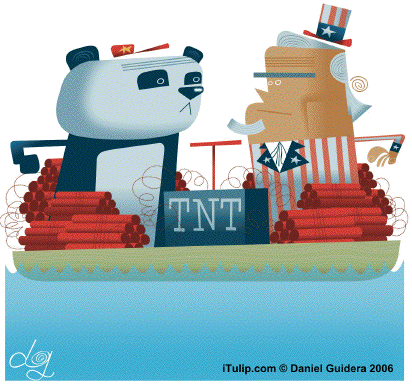 |
Place your bets: The temporal rationality of Congress vs the ruthless rationality of the Chinese government.
We all knew it would come to this eventually. Over the years as the goods made in China piled up in U.S. homes and a mountain of U.S. agency and treasury paper piled up in China, the following idea was proposed by nine out of ten economists with no accountability for their theories, and accepted as expedient truth by U.S. economic policy makers: China will never be so foolish as to sell U.S. Treasury Bonds and crash the U.S. economy, the main source of demand for its goods, and the U.S. Congress will not be idiotic enough to impose trade sanctions on China to force China to devalue its currency and, as a consequence, slow the torrid growth of the Chinese economy, upon which the Chinese government depends to maintain political legitimacy. (Note: Two items comprise the entire list of deliverables that maintain an unelected government in power: domestic economic success or heavy handed domestic repression.)
As we mentioned over a year ago in Economic M.A.D., miscalculation is not rare in international affairs, and is especially likely when the calculations are being made by people who have a well established track record for error.
There is little in the past behavior of the Chinese government to encourage the belief that it will initiate a mutually destructive economic exchange with the U.S. The Chinese government is nothing if not ruthlessly rational. Instances of Congress behaving irrationally and self-destructively, on the other hand, are legion.
Most famously in the area of economically devastating legislation, the signing into law of the populist Smoot-Hawley Tariff Act in June 17, 1930. While proving politicians responsive to the will of millions of unemployed voters the law helped turn a bad recession into The Great Depression. At the time, nine out of ten economists warned of this result, but Congress wasn't listening. Economists warned that it would invite retaliation by European powers. The unpopular Hoover signed the tariff into law anyway, perhaps hoping to score a few political points. Turned out the economists were right that time and that the European threat of retaliation was no joke. We doubt the Chinese are joking, either.
More recently, Congress stood by as a massive housing bubble developed. As we enter the inevitable collapse-and-hearings stage that marks one of the final stages of a bubble, the extent of Congressional economic know-how is revealed. Not easy to watch on a full stomach.
Video Created by Friend of iTulip john67elco on YouTube
Apparently, the Chinese are worried that Congress will behave like Congress, and are making an effort to instill some rationality.
China threatens 'nuclear option' of dollar sales
August 7, 2007 (Telegraph - Ambrose Evans-Pritchard)
The Chinese government has begun a concerted campaign of economic threats against the United States, hinting that it may liquidate its vast holding of US treasuries if Washington imposes trade sanctions to force a yuan revaluation.
Two officials at leading Communist Party bodies have given interviews in recent days warning - for the first time - that Beijing may use its $1.33 trillion (£658bn) of foreign reserves as a political weapon to counter pressure from the US Congress. Shifts in Chinese policy are often announced through key think tanks and academies.
Described as China's "nuclear option" in the state media, such action could trigger a dollar crash at a time when the US currency is already breaking down through historic support levels.It would also cause a spike in US bond yields, hammering the US housing market and perhaps tipping the economy into recession. It is estimated that China holds over $900bn in a mix of US bonds.
On the U.S. side of the table, we have the political think tankers taking the position that the problem is China's policy of maintaining an artificially undervalued exchange rate. The advice is music to your congress-person's ears, because it means they can avoid the more politically difficult question of why their constituents are unable to save enough income to fund the government via taxation and why thus the U.S. is out hat-in-hand borrowing from China in the first place.August 7, 2007 (Telegraph - Ambrose Evans-Pritchard)
The Chinese government has begun a concerted campaign of economic threats against the United States, hinting that it may liquidate its vast holding of US treasuries if Washington imposes trade sanctions to force a yuan revaluation.
Two officials at leading Communist Party bodies have given interviews in recent days warning - for the first time - that Beijing may use its $1.33 trillion (£658bn) of foreign reserves as a political weapon to counter pressure from the US Congress. Shifts in Chinese policy are often announced through key think tanks and academies.
Described as China's "nuclear option" in the state media, such action could trigger a dollar crash at a time when the US currency is already breaking down through historic support levels.It would also cause a spike in US bond yields, hammering the US housing market and perhaps tipping the economy into recession. It is estimated that China holds over $900bn in a mix of US bonds.
A Slow-Moving Chinese Train Wreck
August 7, 2007 (American Enterprise Institute)
As U.S. Treasury Secretary Hank Paulson ends yet another round of Strategic Economic Dialogue talks in Beijing with very little progress to show for his efforts, one cannot help feeling that one is watching a slowly unfolding Greek tragedy. For all the main protagonists of this drama play their parts seemingly oblivious to the very unhappy end towards which their actions are inexorably leading them. And they certainly pay no heed to the growing chorus of Cassandras warning of the grave dangers to the global trade system that lie ahead.
Among the leading protagonists in this drama are Chinese President Hu Jinato and Vice Premier Wu Yi, who represent the Chinese Communist Party in these talks. Filled with hubris, they never seem to tire of reminding Mr. Paulson of China's 5,000-year glorious imperial past. Nor do they tire of making it quite clear that a country of China's historic importance is not about to change its exchange rate policy under pressure from the United States, a relative newcomer on the international stage. Rather, they insist that the Chinese government will set its exchange rate policy exclusively in China's own national economic interest.
The Chinese also make it quite clear by their actions, if not by their words, that they view China's economic interest as that of maintaining an artificially undervalued exchange rate. They do so with a view to allowing China's exports to grow each year by a staggering 30 percent, which they see as the only realistic way that the Chinese economy can absorb the 10 million workers who leave the Chinese countryside for the cities each year.
The question of "who is right," is academic. The questions are, Will Congress push the plunger? And if it does, will China sell? August 7, 2007 (American Enterprise Institute)
As U.S. Treasury Secretary Hank Paulson ends yet another round of Strategic Economic Dialogue talks in Beijing with very little progress to show for his efforts, one cannot help feeling that one is watching a slowly unfolding Greek tragedy. For all the main protagonists of this drama play their parts seemingly oblivious to the very unhappy end towards which their actions are inexorably leading them. And they certainly pay no heed to the growing chorus of Cassandras warning of the grave dangers to the global trade system that lie ahead.
Among the leading protagonists in this drama are Chinese President Hu Jinato and Vice Premier Wu Yi, who represent the Chinese Communist Party in these talks. Filled with hubris, they never seem to tire of reminding Mr. Paulson of China's 5,000-year glorious imperial past. Nor do they tire of making it quite clear that a country of China's historic importance is not about to change its exchange rate policy under pressure from the United States, a relative newcomer on the international stage. Rather, they insist that the Chinese government will set its exchange rate policy exclusively in China's own national economic interest.
The Chinese also make it quite clear by their actions, if not by their words, that they view China's economic interest as that of maintaining an artificially undervalued exchange rate. They do so with a view to allowing China's exports to grow each year by a staggering 30 percent, which they see as the only realistic way that the Chinese economy can absorb the 10 million workers who leave the Chinese countryside for the cities each year.
If Congress does anything to significantly damage China's economy, and this the domestic political position of the Chinese government, you can count on it. They will have to, just as the Europeans did in the 1930s. That is the unforgiving logic of the economic and political relationship between the U.S. and China. What is not known is the strength or fragility of the Chinese government in the eyes of its population, and whether a seemingly minor political move by the U.S. might precipitate an economic and then a political crisis there.
Will Congress push the plunger? Can they behave that irrationally and self-destructively?
It's an election year. Anything is possible.
iTulip Select: The Investment Thesis for the Next Cycle™
__________________________________________________
Special iTulip discounted subscription and pay services:
For a book that explains iTulip concepts in simple terms see americasbubbleeconomy
For macro-economic and geopolitical currency ETF advisory services see Crooks on Currencies
For macro-economic and geopolitical currency options advisory services see Crooks Currency Options
For the safest, lowest cost way to buy and trade gold, see The Bullionvault
To receive the iTulip Newsletter or iTulip Alerts, Join our FREE Email Mailing List
Copyright © iTulip, Inc. 1998 - 2007 All Rights Reserved
All information provided "as is" for informational purposes only, not intended for trading purposes or advice. Nothing appearing on this website should be considered a recommendation to buy or to sell any security or related financial instrument. iTulip, Inc. is not liable for any informational errors, incompleteness, or delays, or for any actions taken in reliance on information contained herein. Full Disclaimer

Comment